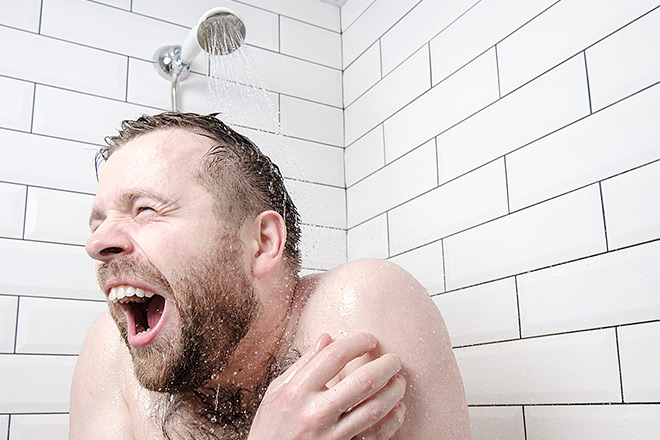The benefits and science of the cold shower

Is it worth the shock of saying goodbye to hot water?
Rob Klovance
For bchydro.com
For the last month, I've been braving icy showers in the name of research. I've been on a quest for a megadose of wake-up and, theoretically, increased resistance to minor illnesses.
Cold showers are all the rage, and they can reduce your energy bills, even as they literally stress your body into releasing hormones. Called catecholamines, these hormones made by your adrenal glands (located just above your kidneys) are released into the body in response to physical or emotional stress.
Releasing the hormones provides an energy boost that is really what the growing popularity of cold showers is all about. Of course there's a list of other purported health benefits, too, plus the energy savings of not using as much hot water. If I keep cold showers going each day for a year, that could translate into $75 in hot water heating savings, plus a little more bounce in my step.
Is it worth it? Am I more energetic and healthier? More productive?
Yes. Maybe. Probably.
Preliminary experience shows that:
- As my wife struggled with a recent cold that led to a sleep-killing cough, I got a minor sore throat and nothing else.
- My most productive day in months began with early morning tennis followed by an icy shower, then rolled on with a decidedly "in-the-zone" workday and an evening bike ride.
- It was far from easy at first, but now I'm getting used to it, sometimes opting for water at its coldest setting.
- Shaving after a shower is not as easy – there's nothing like a pre-warmed face for a shave – but I've adjusted. I'm still using hot water for the actual shave.
Was it the cold showers that guarded me against illness and made me more productive? I'm intrigued enough to extend the experiment.
The easiest route is to ease into the cold
Unless you're the person among friends who's always first to dive into a cold lake or river, you'll find it easier to get used to a cold shower by slowly training yourself to get there.
Start by slowly cooling the temperature at the end of your regular shower, then lengthen that time and go colder the next time you shower. After a few days or a week, you may even be able to try a cold start – or at least a cold-ish entry. That's where that signature shock to the system – those catecholamines again – start to work their magic. It took me a few weeks to get that point, but once you're mentally prepared for the shock of entry, it's amazing how quickly you can get used to the cold.
What health experts have to say
There is little agreement on the benefits of cold showers, other than the fact that the shock does release hormones that theoretically energize you. Whether that's a good or bad thing for you is inherently personal.
Although the evidence is generally inconclusive, here are some of the purported benefits of a cold shower:
- Relief of depression: Cold exposure can improve your mood, with the idea that it activates the sympathetic nervous system and the release of noradrenaline to the brain.
- Fat loss: Cold can activate brown adipose tissue (so-called brown fat) to burn calories and generate heat.
- Increased immunity: A higher metabolic rate, the result of the catecholamines being released by that cold shock, can result in an increase in the production of white blood cells, which protect against illness.
- Muscle recovery: Go into a football dressing room after a game, and you'll see knees wrapped in ice. And ice baths are now a go-to recovery routine for hockey players and other athletes.
- Better skin and hair: Hot water can dry out skin and strip both your skin and scalp of healthy oils. Cold water gives them a break.
Save on hot water, and fix those leaky taps, too
If two people in a household both went cold turkey on hot showers for a year, they could save $150 a year or more on energy costs. But that's not for everyone, and there are other ways to ensure you're being smart with your hot water use.
Even taking shorter hot showers adds up, with just a minute trimmed off shower time adding up to about $30 in savings when practised by two people over a year. Take care, meanwhile, to turn the water off while shaving, soaping up your hands, or brushing your teeth.
And then there's the leaky faucet. Do an inspection a couple times a year, and learn how to fix leaks. Even a slow-dripping leak can cost you $9 a year.
Oh, and don't forget the laundry. Doing three washes per week in cold water could save you $22 a year.
Related: